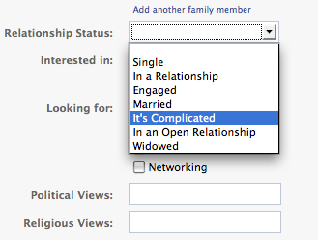Study: stalking your ex on Facebook is bad for you

Turns out, obsessing over your ex on Facebook isn't just kinda creepy - it's also not good for you.
So-called "Facebook stalking: ex-partners is the focus of a new article published in the academic journal Cyberpsychology, Behavior and Social Networking.

Facebook Surveillance of Former Romantic Partners: Associations with PostBreakup Recovery and Personal Growth by Dr. Tara C. Marshall, Ph.D., tells us that online post-breakup fixation on your ex is really not a good idea if you want to get over it, heal your heart, or get back into personal growth patterns.
And even though "all the kids are doing it" - it's not going to be helping out anyone's mental health anytime soon.
The paper explains,
Not only do people use Facebook to monitor the activities of current romantic partners, but as many as one-third use Facebook to keep tabs on former romantic partners.
While Facebook surveillance of ex-partners has been linked to negative outcomes such as online and offline relational intrusion, the potential for Facebook contact and surveillance to disrupt emotional recovery and growth following a breakup has received little research attention.
The question many of us have is - how much wallowing in status updates and photo uploads is part of getting over it, and when does re-checking their page become problematic?
What's interesting to note, along with contemplating the question as to whether or not keeping tabs on an ex is a viable coping strategy for getting through heartbreak, is just how widespread and seemingly socially acceptable "Facebook stalking" - itself a form of interpersonal surveillance - has become.
Facebook Surveillance continues,
(...) In particular, people may use Facebook to keep tabs on an ex-partner’s current activities by checking his or her status updates, wall posts, comments, and photos; even if one is no longer Facebook friends with an ex-partner, publicly available information - such as a profile photo and list of friends - can still provide a rough approximation of the expartner’s ongoing activities.
Recent estimates have suggested that one-half to two-thirds of people have made contact with an ex-partner through Facebook, and that over half admit to having looked through an ex-partner’s photos to find pictures of an ex-partner with a new romantic partner.
Not only is Facebook surveillance of ex-partners relatively common, then, but people who engage in it tend to perceive it as harmless.
Other research suggests, however, that Facebook may facilitate behaviors associated with obsessive relational intrusion - the unwanted pursuit of an intimate relationship, particularly with an ex-romantic partner.
Marshall's study informs us that remaining Facebook friends with an ex-partner and/or engaging in surveillance of their Facebook page results in worse breakup adjustment and growth (than would be experienced in similar offline behaviors), and stunts breakup recovery.
For instance,
Even for individuals who do not engage in relational intrusion, monitoring an ex-partner’s online behavior may increase distress over the breakup and prolong pining for the former partner.
For example, looking at an ex-partner’s Facebook photos may renew desire for the former partner, or it may be upsetting to discover through Facebook that an ex-partner is involved in a new relationship.
For the study, 464 participants were recruited by posting links to an online survey on several psychology survey-hosting websites.
Participants were required to have a Facebook account and have experienced at least one relationship breakup with someone who also has a Facebook account.
They were surveyed about online and offline contact with their ex, whether or not they were Facebook friends with their ex, and queried as to the frequency with which they checked on their ex's Facebook page and/or status (including checking out their ex's profile photos).
In all, 57% were still 'Facebook friends' with their exes.
The study reported,
Of the people who were not Facebook friends with the ex-partner, 25 percent reported that they had defriended the ex-partner, 12 percent reported that the ex-partner had defriended them, and 6 percent reported that they had never been Facebook friends with the ex-partner at any point in time.
The study found that staying "friends" wasn't the problem:
Contrary to expectations, people who remained Facebook friends with an ex-partner were lower in negative feelings, sexual desire, and longing for the former partner than people who were not Facebook friends.
The problem, it seems, is keeping the ex-partner effectively under surveillance:
(...) In spite of the need for further research, the take-home message from the present study is that keeping tabs on an expartner through Facebook is associated with poorer emotional recovery and personal growth following a breakup.
Therefore, avoiding exposure to an ex-partner, both offline and online, may be the best remedy for healing a broken heart.
This study focused on Facebook, yet we're well aware there are so many other points of social media contact we have with those we care about.
I think the study's messages about breakups, online connections and mental health are equally as important in the context of our contact in and on other social networks.
It's possible the study results suggest that with social media connections, breakups have the potential to be a bit more painful than before.
Easing the pain of heartbreak is no easy feat, especially when social media has us connected and able to "watch" our loved ones like never before.
One thing's for certain: we've got plenty of awful emotional crap to wade through when we have to make breakup decisions around unfriending and untagging, no matter who did the breaking up or why.
But we also need to look at how much Facebook obsessing is part of the healing process before it becomes creepy, or even harmful to others - or becomes an act of self-harm.